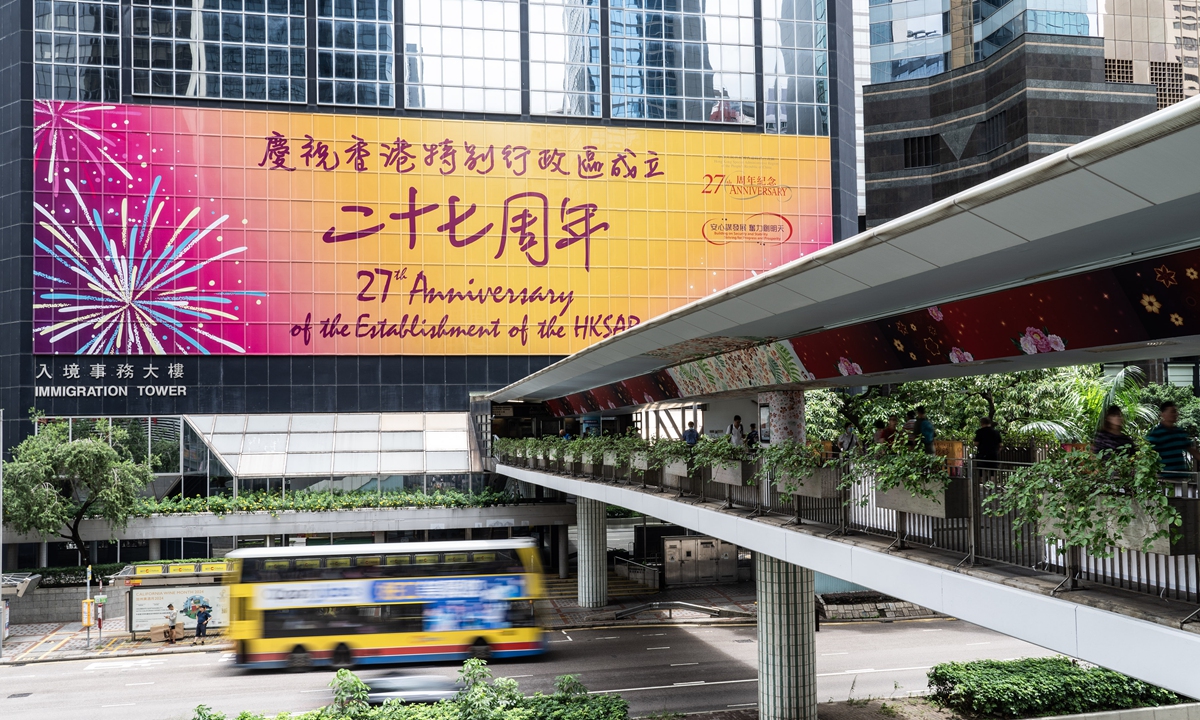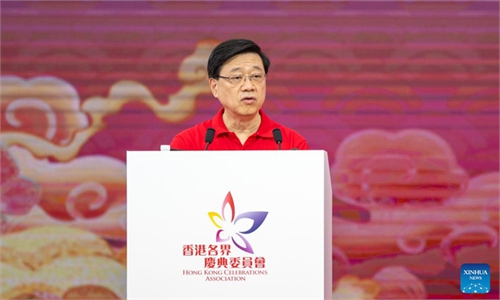HK welcomes favorable news on 27th anniversary of its return to motherland
Measures fully demonstrate central government’s care, concern and strong support for SAR

City view of Hong Kong Photo: cnsphoto
Hong Kong welcomed two pieces of good news on Monday on the occasion of the 27th anniversary of the city's return to the motherland. It will soon receive another pair of giant pandas from the mainland, while non-Chinese permanent residents in the city and in nearby Macao can apply for travel documents to mainland starting from July 10, a move to further facilitate the exchanges and interaction between the mainland and the country's two special administrative regions (SARs).
Local officials and experts said these two new measures fully demonstrate the central government's care, concern, and strong support for the HKSAR, with the unique positioning and advantages of Hong Kong becoming increasingly prominent under the "One Country, Two Systems'' principle.
At a ceremony to mark the anniversary on Monday morning, HKSAR Chief Executive John Lee said the central government has agreed to gift another pair of giant pandas to Hong Kong, and the pair are scheduled to arrive in the city in the coming months.
The HKSAR government has begun preparatory work for welcoming the giant pandas, a government spokesperson said.
"I would like to express my deepest gratitude to the central government for gifting another pair of giant pandas to the HKSAR, which fully demonstrates its care and support for our city," Lee said. "This year marks the 75th anniversary of the founding of the People's Republic of China, which makes this gift even more special.".
The two pairs of giant pandas given by the central government in the past have accompanied generations of Hong Kong residents, which is the collective memory of all. "The new pair of giant pandas will become close 'family members' of Hong Kong residents, bringing us laughter and joy," Lee noted.
As the first generation of giant pandas living in Hong Kong, An An and Jia Jia, have passed away, leaving only Ying Ying and Le Le, who arrived in 2007, Ocean Park Hong Kong is ready to welcome new giant pandas at any time, several HKSAR deputies to the NPC confirmed.
Chan Yung, vice chair of the Democratic Alliance for the Betterment and Progress of Hong Kong, told the Global Times in an earlier interview that there is a chance that the mainland will gift the new pair before October 1.
Also on Monday morning, China's National Immigration Administration (NIA) announced that to further facilitate the exchanges and interaction between people from the mainland and Hong Kong and Macao, and to support the better integration of the two SARs into the national development agenda, starting from July 10, 2024, travel documents for entering and exiting the mainland will be issued to non-Chinese permanent residents of Hong Kong and Macao.
Currently, non-Chinese permanent residents of Hong Kong and Macao, like their Chinese counterparts, have an increasing need to visit the mainland for investment inspections, business negotiations, academic seminars, technological exchanges, and tourism. Exchanges and interaction between people from Hong Kong, Macao, and the mainland are becoming frequent and closer, the NIA said.
Non-Chinese permanent residents of Hong Kong and Macao can voluntarily apply for a mainland travel permit. Holders of the permit can travel to the mainland multiple times within the five-year validity period of the permit, with each stay not exceeding 90 days, the authority noted.
The implementation of this new policy will further promote extensive exchanges and facilitate business and trade investments, cultural tourism, educational research and other activities, the NIA said.
Full support
When commenting on the new policy unveiled by the NIA, Hong Kong's Chief Secretary for Administration Eric Chan Kwok-ki said it's expected to attract more foreign talent to settle and establish roots in Hong Kong.
"Leveraging Hong Kong's advantageous position of 'backed by the motherland and connected to the world,' they can better explore and seize development opportunities in the mainland," Chan said in a social media post on Monday.
"Whatever a fantastic news!It is a great gesture to facilitate travel to China in general. It is also another move to further facilitate the long-term plan of integration of the Greater Bay Area (GBA)," Angelo Giuliano, a Hong Kong-based business representative from Switzerland, told the Global Times on Monday.
Hong Kong now is finally being able to conduct deep reforms and benefit from a much more stable social environment, especially since enacting of the National Security Law for Hong Kong, Giuliano said, noting that the city needs to "get away from a colonial-era political and economic setup."
"We can see 'game-changer' projects that will greatly alleviate housing issues like the Northern Metropolis, which will help in the greater integration of Hong Kong within the economy of the GBA," the Swiss business representative said. "In other words, things are moving in Hong Kong and they are moving in the right direction."
In an article published on Monday, Lee said that One Country, Two Systems is an unprecedented great innovation with great vitality and immense superiority, and a good policy for safeguarding our country's sovereignty, security and development interests.
Over the 27 years since Hong Kong's return to the motherland, "One Country, Two Systems'' has been put into practice and been tested on all fronts for 27 years, Lee said.
Facts have proved that no matter how uncertain the world is, no matter how the US and some Western countries bully and curb our country's peaceful development, and no matter how many difficulties and obstacles we have encountered, with the staunch support from our country and the concerted efforts of all citizens, Hong Kong has gone from strength to strength, Lee noted.
A flag-raising ceremony was also held at Golden Bauhinia Square in Wan Chai on Monday morning to mark the anniversary, which was also the first one after the completion of the Article 23 legislation.
"This year marks the complete reshaping of Hong Kong's political landscape and governance model, thereby laying a solid political foundation for Hong Kong's future development and enabling it to write a new chapter at this historical new starting point,'' Lau Siu-kai, a consultant from the Chinese Association of Hong Kong and Macao Studies who is also a senior policy advisor to the HKSAR government, told the Global Times on Monday.
In recent years, the reshaping of Hong Kong's political landscape and changes in governance thinking and methods have largely removed many internal political factors that hindered Hong Kong's economic development and improvement of people's livelihoods. However, external pressures from the West not only persist but are likely to intensify, Lau said.
"This requires Hong Kong, under the leadership and support of the central government, to further consolidate and enhance its hard-won new political landscape and governance model," Lau said.
On this basis, Hong Kong must vigorously promote and implement new development strategies, including accelerating integration into the national development agenda, promoting industrial transformation and upgrading, addressing key livelihood issues, and expanding international economic development opportunities, Lau noted.


